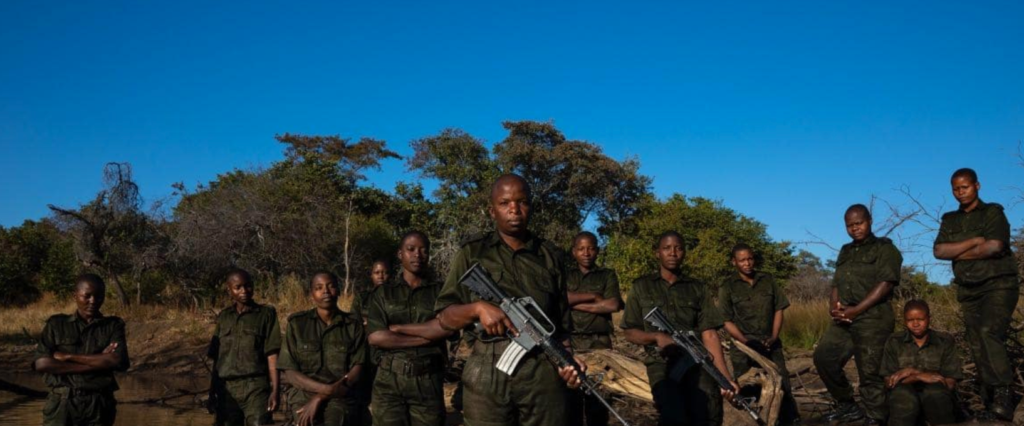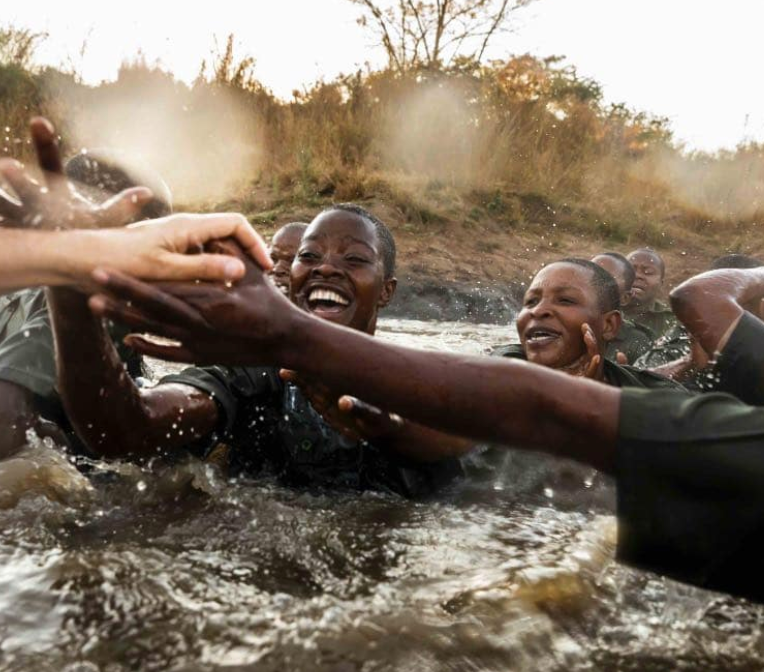Featured in the National Geographic Wildlife documentary Akashinga: the brave ones, Akashinga are Africa’s first armed, fully plant-based anti-poaching unit made up of only women. They have made it their mission to protect the endangered wildlife in Zimbabwe and to arrest all poachers, without firing a single shot.
They are not the first all-female anti-poaching unit in the world—that title goes to South Africa’s “Black Mambas,” another admirable force to reckon with that have been protecting South Africa’s wildlife since 2013. Yet, the Akashinga differ from other female anti-poaching groups including the Black Mambas, as they are the only ones that are armed. Other groups use methods like destroying poacher’s camps, and removing snares and traps. If they want to arrest poachers they usually call for armed back-up and support from the police. The Akashinga also differ in that they are all-vegan, which most other groups are not. While the group is armed, they try not to use their weapons. Instead they detain poachers and turn them over to the police.

The beginning of Akashinga
The initiative was started in 2017 by Damien Mander, a former Australian sniper who founded the International Anti Poaching Foundation back in 2009. The all-female Akashinga go through a tough training process, including going through four pillars of misery—hunger, exhaustion, cold, and wet. The training they receive is similar to the training special forces get in the military. That way, the Akashinga are well prepared for their duties of protecting the endagered wildlife.
Akashinga—the brave ones
The word Akashinga means “brave ones” in Shona and that is what all these women are. Most of them are survivors of sexual abuse, domestic violence and trauma. As part of the Akashinga they not just learn vital skills to protect themselves and the African wildlife, they also have the chance to leave potential hostile living environments as well as poverty. They can support their communities and their families and get a good education. As part of their approach, Akashinga also teaches the communities in the surrounding areas the economic benefits of preserving the wildlife and the importance of sustainability and protecting the environment. Education is a key element in eliminating poaching and enabling change.

The future (of anti-poaching) is female
Groups like the Akashinga and the Black Mambas show that women are as capable as men to work as rangers and protect endagered wildlife. Who better to protect and preserve the wildlife than the women who have grown up with it and have been the preservers of their communities? Their success has increased the respect for women. They also help women, who are sadly still more marginalized in many parts of of the world, to become independent and self-reliant.
Studies also show that women seem to be less prone to corruption, which especially in parts of Africa still is a big issue. Allowing trophy hunting and poaching can bring a lot of money to the government and so it’s no wonder corrupt people try to benefit from those atrocities. Having an anti-poaching unit that does not fall into the trap of corruption greatly benefits the wildlife as well as the communities. Corruption might bring money in the short-term, but protecting the wonderful nature and wildlife, preserving the environment, educating the locals and putting well-earned money back into the communities will have a much greater impact in the long-run.
Today, poaching has seen a reduction by more than 80% in the areas the IAPF and the Akashinga operate as they have arrested hundreds of poachers so far. And their work is far from over. Sadly, due to the pandemic poaching all over Africa has seen an increase. Little to no tourism income has made it much easier for poachers to do what they want to do.
Yet, with the work and determination from amazing groups like the Akashinga, we can dream of a world where all animals are save and poaching is a relict from the past. Those women are truly inspiring and I see them as some of my top feminist idols and so should you. 🙂
Learn more about this badass group of women on the website of the International Anti Poaching Foundation.
Get more like this—Sign up for our daily inspirational newsletter for exclusive content!
__
Photo: IAPF




